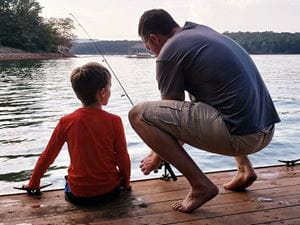
Your dad likely looks forward to June for the swimming, grilling, and summer weather. More importantly, June is the month when we celebrate Father's Day. It's a beautiful day when we show our dads and father figures some extra love and appreciation. That special day when we promise not to complain about his dad jokes.
The holiday idea makes sense to us now, but have you ever thought about how Father's Day came to be? It's celebrated in numerous countries worldwide, but the history of Father's Day is relatively new in America. For example, did you know the idea of promoting fatherhood and honoring fathers was initially met with resistance? It took years of efforts by organizations and individuals to establish Father's Day as an official holiday. So let's take a deeper look into the history of Father's Day.
The story behind Father's Day.
The campaign to celebrate fathers didn't meet the same enthusiasm as Mother's Day because, according to one florist, fathers don't have the same sentimental appeal as mothers. In 1908, a West Virginia church funded the nation's first event in honor of fathers. It was a Sunday sermon to commemorate the 362 men who died in the explosions at the Fairmont Coal Company mines in Monongah. Still, it was a one-time event, not an annual holiday.
Like Mother's Day history, the genesis of Father's Day can be traced back to the early 20th century. The story begins with a woman named Sonora Smart Dodd in Spokane, Washington, who her widowed father inspired. She and her five siblings were raised by their dad, a single parent and Civil War veteran. History.com states that Dodd wanted to create an official day like Mother's Day and offered the idea to YMCAs, local churches, and government officials.
Due to her success, the first Father's Day was celebrated on June 19, 1910, in Spokane, Washington. However, it wasn't until years later that it gained popularity in other parts of the country. President Wilson honored the day by unfurling a flag in Spokane in 1916. In 1924, President Coolidge encouraged states to recognize the day. Still, it wasn't easy. However, in 1972, Father's Day became officially recognized as a national holiday in the United States, signed into law by President Richard Nixon.
Now, we celebrate the day honoring fathers in the United States on the third Sunday of June. Fathers are honored in other countries, especially in Latin America and Europe, on St. Joseph's Day, a Catholic holiday on March 19.
Father's Day controversy.
However, many men continued to despise the day. One historian wrote that men scoffed at the holiday's attempt to domesticate manliness or put down the proliferation of these holidays as a commercial gimmick to sell products, typically paid for by the father himself. During the 1920s and 1930s, a movement developed to eliminate Mother's Day and Father's Day in favor of a single holiday, Parent's Day.
Every year on Mother's Day, pro-Parent's Days groups gathered in New York City's Central Park as a reminder that both parents should be respected and loved together. However, the Great Depression disrupted this effort to combine and decommercialize the holidays. Struggling advertisers and retailers doubled down to make Father's Day a "second Christmas" for dads, promoting gifts like hats, socks, ties, golf clubs, and greeting cards.
At the start of World War II, advertisers argued that celebrating Father's Day was a way to support the war effort and honor American troops. Father's Day wasn't a federal holiday at the war's end but a national institution.
The changing roles of fathers.
Throughout the years, the idea of fatherhood has changed. It's not typically a big day, but it's become a day that celebrates what your dad likes, whether flying, fishing, or go-carting. It emphasizes the more significant roles that fathers play regarding their children. This change is partly due to society's evolution.
There aren't any more vast armies of workers laboring away in industrial factories while women spend hours handwashing and hand-stitching the family's clothes. The current role of fathers has changed so that fathers and mothers are partners, each taking more responsibility within the family. Now, fathers are seen as significant influences in their children's lives.
Studies have shown what happens when a father lacks in his children's lives. In a sense, Father's Day today helps show the value and importance of fatherhood and the gifts beyond material goods that a father gives his family and children.
The importance of celebrating Father's Day.
There are numerous reasons to honor your father on Father's Day; many can be found in the holiday's history. While Sonora Dodd's father was more of an exception to the rules then, many dads do just as much domestic work and caregiving as mothers. Despite the initial pushback, it's fair to believe that your father appreciates receiving Father's Day gifts to see that care.
Father's Day is a reminder of the importance of fatherhood. Celebrating and recognizing fathers can raise awareness of their critical role in raising happy, healthy, and well-adjusted children. Celebrating fathers on Father's Day is a way to show appreciation for their dedication and hard work. It's a chance to show gratitude for the love they give and the sacrifices they make. Most of all, it can strengthen the bond between children and their fathers.

